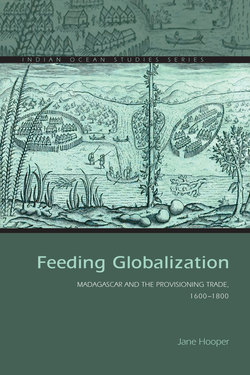Feeding Globalization

Реклама. ООО «ЛитРес», ИНН: 7719571260.
Оглавление
Jane Hooper. Feeding Globalization
Отрывок из книги
ADVANCE PRAISE FOR FEEDING GLOBALIZATION
“Hooper meticulously reconstructs a convincing picture of how the steady demands of European shipping and colonies for food supplies stimulated the emergence of state formation in western and eastern Madagascar.”
.....
Despite opportunities for scholars to trace the shifting relationships between European traders and coastal rulers through these documents, the use of such sources can encourage us to overstate the impact of Europeans upon the island’s history, society, and culture. The provisioning trade presented new opportunities for many in Madagascar, allowing for the creation of new coastal trading enclaves as well as providing new idioms of power and leadership to the islanders. In spite of this fact, the most important (in terms of both quantity and frequency) and longest-running exports from the island were probably via the northwest ports of the island to the Comoros, East Africa, and the northern Indian Ocean. Europeans knew little of these exchanges or how the networks had become intertwined in complex ways with their own by the nineteenth century.
The information found in ship logs is also limited by the nature of European visits to Madagascar. Europeans rarely had time to learn much of island cultural practices or their language during their stays. Most strikingly, European references to locations visited on the shores of the island were frequently confused and it is sometimes hard even to discern which parts of Madagascar they visited and with whom they traded.64 The other major shortcoming of these sources is clear from the outset: the writers had only limited knowledge of the goings-on in the interior of the island. With their stays almost entirely limited to the beaches and direct shoreline, captains and trading officials knew little about (and demonstrated an overall lack of interest in) events occurring in the interior. This coastal focus limits our understanding of the sources of slaves for sale, the origins of rice sold in ports, and the expansion of highland states far into the interior during the eighteenth century. Europeans provide relatively reliable information about prices and items purchased, but their grasp of political dynamics on the island was limited and tinged by their own understandings of states and leadership.
.....